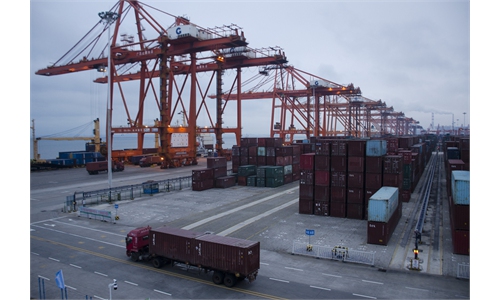Chinese people truly tired of Washington’s narcissistic show: Global Times editorial

China US photo:GT
Washington has once again floated a trial balloon on the issue of "China tariffs." This time, its excuse is China's countermeasures against US House Speaker Nancy Pelosi's visit to the Taiwan island. US media outlets quoted a "source" familiar with the matter as claiming that the Biden administration is rethinking potential tariff moves on Chinese products. Over the past months, Washington has repeatedly sent contradictory signals on the tariff issue. One minute, it says it's considering scrapping some tariffs on China. But the next, it says it'll keep tariffs as leverage in the power game against China. The whole process is like one-man face-changing show performed by Washington in front of the world.
Imposing additional tariffs on Chinese products is a stupid and wrong move taken by Washington. It wrongly attributed US' problems to the argument - China earns American money and steals American technologies. The US went against economic laws and disregarded international rules to launch the trade war against China, believing it can make China "spit out what it has eaten." However, in the years since the trade war started, China's foreign trade has not been strangled, and on the contrary, it has even set historical records, including the figure of China-US trade volume. Officials in Washington explicitly acknowledged that some of the tariffs implemented by the previous administration were not strategic and instead raised costs on Americans. American consumers are bearing 92.4 percent of the costs of the tariffs applied to Chinese goods, according to a report published by Moody's Investors Service last year.
An unconditional cancellation of tariffs on Chinese products is not at all a "show of goodwill" by the US to China, much less a "gift," but a mistake to be corrected. In fact, Washington's "tariff war" is indeed going nowhere.
The Biden administration is hurt by a rock lifted and dropped by the Trump administration. But Washington is now suffering the pain and always thinking about "removing tariffs" in exchange for something. The US is so narcissistic that it thinks one glance from it could unsettle China, making China sway by considerations of gain and loss and thus be hurried to make concessions. But frankly speaking, few people in China care about these messages, so they can hardly cause any wave. The Chinese society is already tired of the show the US has put on.
Washington is releasing complex and sometimes contradictory signals on the tariff issue. This is a "political survival instinct" to avoid the accusation of "being soft on China" in the toxic US atmosphere toward China. This time, the US has once again shown its "toughness" over tariffs as some kind of response to the current situation in the Taiwan Straits. It seems to be more of an act aimed at politicians and public opinion at home, because otherwise, they can't report about what they have fulfilled.
This at least reflects one thing: US' ability and efficiency in correcting political mistakes are significantly declining. In the past few years, an absurd scene has occurred in Washington: Politicians are going around canvassing, and the focus of the competition is no longer on whose policy proposals can better promote the development of the US economy and resolve conflicts in US society. Instead, it is about who is tougher on China. Once any candidate shows a slight trace of rational and pragmatic attitude toward China, the attitude could become the "weakness" of that politician. However, isn't the trend showing real weakness when the politicians are yielding to radical sentiment and public opinion in the US?
Besides, the US is the only superpower in the world. It has always been the bully, but when has it been bullied by others? In the realistic level of China-US relations, the US has always been the one that provokes China, so where does this "being soft on China" rhetoric come from? This is a psychological disease in politics that needs to be treated. The endless competition of "who is tougher on China" will make Washington lose itself and the courage for self-renewal. Moreover, the overall posture the US has shown in front of the world is becoming less and less honorable and more and more erratic.
Chinese philosopher Confucius once said, "The noble man is always at ease with himself, while the inferior man is always anxious." China's attitude has always been clear and consistent on the tariff issue. We urge the US to unconditionally remove all the additional tariffs imposed on China as soon as possible. This is in its national interest and shows its responsibility to the world as a great power. Washington must not act like an inferior man and use the tariffs to bargain with China or even blackmail China. Otherwise, it will surely face setbacks.

